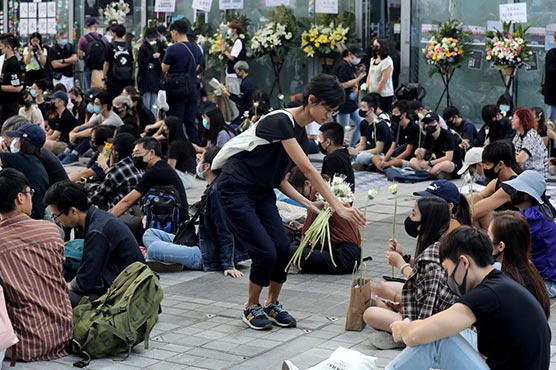Hong Kong braces for weekend of fresh anti-government protests

Many Hong Kong residents are angry with what they believe is excessive force used by police.
HONG KONG (Reuters) - Hong Kong is preparing for a weekend of demonstrations, including a human chain at major subway lines on Friday and a democracy march on Sunday, the latest moves in more than four months of anti-government protests.
It has been two weeks since Carrie Lam, leader of the Chinese-ruled city, invoked colonial-era emergency laws banning face masks, hoping to quell protests. Instead, the city has been shaken by some of the most intense unrest to date.
Although the last few days have been relatively calm, with protesters staying off the streets, prominent human rights activist Jimmy Sham was brutally attacked on Wednesday, a move pro-democracy lawmakers said was meant to intimidate protesters and incite violence ahead of Sunday’s planned march.
Police on Friday rejected a permit request for the march, meaning it will be an illegal rally. Thousands of people have defied police in the past and staged mass rallies, often peaceful in the start but descending into violence at night.
“We will not back down even after the attack on the Civil Human Rights Front convener Jimmy Sham. Our most powerful force is the unity and resistance of this civil society,” said the rights group, calling on the public to rally on Sunday.
Pro-democracy protesters have called for a 40 km (25 mile) human chain outside metro stations on Friday night, asking people to wear face masks in defiance of the ban.
Hong Kong has been battered by four months of protests, driven by concerns Beijing is eroding freedoms granted when Britain handed the city back to China in 1997.
China has denied the accusation, blaming foreign nations such as the United States and Britain of inciting the unrest.
The crisis in the Chinese-ruled city is the worst since the handover and poses the biggest popular challenge to China’s President Xi Jinping since he took power. Xi has warned he would crush any attempt to split China.
Riot police and protesters have fought street battles, with police firing tear gas, rubber bullets and occasionally live rounds against brick and petrol-bomb throwing activists.
Two people have been shot and wounded by police and thousands injured. Police have arrested more than 2,300 people since June, many of them teenagers as young as 12.
Many Hong Kong residents are angry with what they believe is excessive force used by police.
Hong Kong’s Commissioner of Police, Stephen Lo, said on Friday that his force was facing an unprecedented challenge.
“Our hearts are heavy; our responsibilities are immense. I remain steadfast in my conviction that we can weather the storm and restore the law and order for our city,” he told a ceremony for past fallen officers.
Embattled Hong Kong leader Carrie Lam has refused to agree to the protesters’ 5 core demands: universal suffrage, an independent inquiry into police behavior, amnesty for those charged, stop describing protesters as rioters, and the formal withdrawal of a China extradition bill.
The extradition bill, which would have allowed Hong Kong residents to be sent to Communist Party-controlled courts for trial, was seen as the latest move to erode those freedoms and sparked the unrest. Lam has said the bill is now dead, but it has not been formally withdrawn.
The Asian financial hub is facing its first recession as a result of the unrest which has damaged tourism and retail.
Hardcore protesters have torched the city’s metro stations and Chinese banks and scores of shops they believe are linked to mainland China. Many businesses have been forced to close.
Secretary for Transport and Housing, Frank Chan, said on Friday it would be weeks before the metro operated fully.
“It all depends on whether or not there will be incoming damage. If everything remains normal and there would be no further attack or damage, then I would say that one or two weeks would be possibly the target,” he said.

